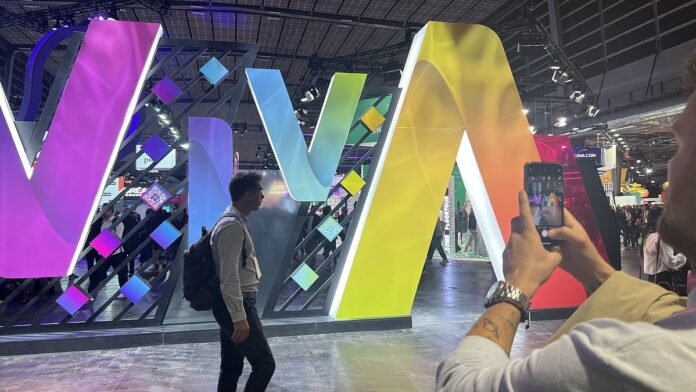Hundreds of speakers weigh in on the upheavals caused by artificial intelligence (AI) at the Viva Technology trade show in Paris. Tech experts told Euronews Next how Europeans can make sure they are not left behind.
As generative artificial intelligence (GenAI) develops, the impact of this technology is more tangible than ever, but one of the main challenges will be to train enough people in new skills required by the AI revolution, tech insiders told Euronews Next.
“We don’t see AI replacing humans, but humans using AI can replace those who don’t”said Lisa Heneghan, Global Chief Digital Officer at KPMG.
Ms Heneghan was speaking at VivaTech in Paris this week during a session titled “Upskilling/reskilling: Future-proofing your career in the AI age.”
“One thing is certain: Organizations need to start now, so we help them find a framework.” she declared.
KPMG, one of the world’s largest auditing and consulting firms, hopes to be a leader in helping businesses adopt artificial intelligence.
The group claims to have trained more than 85,000 employees to learn and adopt this technology.
“About 12 months ago, we started making very significant investments, several billion dollars, working specifically with Microsoft initially, and those investments were about AI,” she added.
Is Europe ready for artificial intelligence?
Like companies, countries are also preparing for the AI revolution.
France made a series of announcements this week ahead of VivaTech, which aims to boost French and European artificial intelligence.
On the eve of VivaTech, President Emmanuel Macron welcomed the French AI elite at the Élysée Palace and announced a plan to make Paris an “AI capital” and organize an international summit in 2025.
Guests included representatives from French technology companies such as Mistral AI and Scaleway, a French cloud provider with ambitions to become a hyperscale Europeans capable of competing with Google or Tencent.
To advance the AI revolution, Europe needs a lot of equipment and capacitysaid Jean-Baptiste Kempf, the French computer scientist behind the VLC video application, who is now working on growing Scaleway.
“A lot of companies are using American clouds, which raises big questions about sovereignty. You’d have to be naive to think that the Europeans weren’t too naive, in my opinion.” says Mr. Kempf.
But he says he is convinced of that “Europe still has a card to play in this technological revolution.”
According to Adrien Chaltiel, co-founder of innovation funding platform Eldorado, France has become increasingly competitive in artificial intelligence and investment has returned to high levels.
“Everyone has improved their skills and there are founders who have now found very high-tech problems”he declared.
“To be competitive with the US, we need the same level of technology and funding. We have managed to bring back some talent, but we also need more pioneering companies to keep wages at a level “There is also a geopolitical aspect to this and that is why Macron is getting involved.” added Adrien Chaltiel.
Several world-renowned French computer scientists have moved to the US to continue their research, the most famous among them being Yann Le Cun, head of AI research at Meta. He is again present at VivaTech this year.
“America’s strength is its ecosystem. In San Francisco, there are events every night, everyone presents their solution in five minutes, we eat three pizzas and discuss.”says Florian Barbaro, who worked on artificial intelligence in the US before returning to France to create his company UncovAI in Nice.
UncovAI offers innovative solutions to detect AI-generated content and combat disinformation.
“Some states are ahead in the use of generative models. In Ukraine, Russia is using videos generated by Synthesia, and we are not doing much to counter this.”declared the young entrepreneur.
Mr. Barbaro explained it detecting AI-generated data is also a major challenge for the AI ecosystem.
“Tomorrow, if a company wants to extract data from the Internet to update its model, it risks doing so on generated data, which can generate bias and reduce accuracy,” said Mr. Barbaro.
